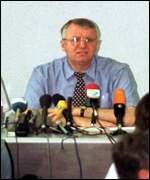From the esteemed Helsinki Committee For Human Rights, a long but well worth reading document on Anti-Semitism in Serbia, past and present. It can be downloaded here
Also, here is a great article on the results of a "round table discussion" the Committee had on the issue of Anti-Semitism in Serbia today, and especially how the Serbian "new right" ties in with it.
Read and be enlightened, so you won't be deceived!
http://www.helsinki.org.yu/focus_text.php?lang=en&idteks=1564
**********************************
THE NEW SERBIAN RIGHT AND ANTI-SEMITISM
- A SUMMARY REPORT -
12/20/2005
THE NEW SERBIAN RIGHT AND ANTI-SEMITISM
- A SUMMARY REPORT -
The round table titled “The New Serbian Rights and Anti-Semitism” was organized on November 2, 2005, in the Belgrade Media Center. This first in the series of activities under the project “Overcoming Anti-Semitism and Nationalistic Prejudice” – implemented with the assistance of the Council of Europe – provided the guidelines for further discussion of racism, xenophobia, anti-Semitism and other forms of intolerance and hate speech in today’s Serbia.
Five keynote speakers addressed the panel assembling around forty participants. Sonja Biserko, chairperson of the Helsinki Committee, Aleksandar Lebl, journalist and president of the Commission for Monitoring Anti-Semitism (Federation of Jewish Communities in Serbia-Montenegro), writer Mirko Djordjevic, journalist Teofil Pancic and writer Filip David tackled the topics such as “Contemporary Anti-Semitism in Serbia and Worldwide,” “The New Serbian Right,” “Pop Culture and the Issue of Diversity” and “Discrepancy Between Declaration and Practice: Serbian Authorities' Attitude Towards Anti-Semitism and Other Forms of National and Religious Intolerance.”
The round table concluded that anti-Semitism in Serbia should not be perceived as an isolated phenomenon but ascribed to the overall radicalization of Serbian politics and society. In this context, anti-Semitism and its manifestations perfectly fit in the predominant exclusionist politics and conservative thought that negate any dissimilarity be it ethnic, religious or other.
The persistence of anti-Semitism is thus even more dangerous as it goes for the small Jewish community of no great weight in Serbia’s finances or politics. Major promoters of such anti-Jewish climate are to be traced down in a number of formal groups ranging from those that follow in the footsteps of a part of the Serbian Orthodox Church’s tradition leaning on the teachings of recently sanctified Bishop Nikolaj Velimirovic and his overt anti-Semitism, through those in the limelight of pop culture to today’s authorities unwilling to come to grips with growing intolerance.
Here are some excerpts from keynote addresses.
Sonja Biserko: ”Raising the questions of anti-Semitism, xenophobia, and all forms of intolerance and discrimination goes in parallel with current international trends…A number of international summits/conferences discuss and define the frameworks for combating these phenomena. Their final documents detail such negative trends, including hate speech and hate crimes, and label them threats to democracy (tolerance) and the respect for human rights…If Serbia has an eye on getting integrated into European and global institutions, she must do by far more than merely adopting international political and legal guidelines. Serbia has to face up all her traditions, past experiences and today’s problems, if she want to be recognized as a democratic and tolerant society open to diversity…Thus, the main objective of this project is to sensitize both the civil sector, the media and NGO coalitions to shower public opinion with factual information about these unacceptable trends, and the authorities to pursue proactive politics in combating racism, xenophobia and anti-Semitism.”
Aleksandar Lebl: “…Recent years were marked by the revival of anti-Semitism worldwide – in developed Western democracies, societies in transition and underdeveloped countries, not to mention the Islamic world. Once again, anti-Semitism is “in” in intellectual circles in many countries. It is spread by the media, books, public lectures, the Internet. Sometimes it is expressed in roundabout ways, sometimes openly, but is, as a rule, camouflaged as anti-Zionism and anti-Israelitic stances…Claims that Jewish conspiracies are aimed at dominating the word have practically never been crossed out…The world has become aware of this threatening revival…Many countries’ legislations provide that anti-Semitism and glorification of Nazi leaders and symbols are criminal offences…We are witnesses to the growing anti-Semitism in Serbia.”
Mirko Djordjevic: “…The phrase “the new Serbian right” is not in itself too complicated to be understandable. However, its origin remains unclear. In its current form, it has been present throughout the past fifteen years, ever since some ideological groups have stepped on the public scene. These groups have occupied the void left after the fall of Russian communism…We are talking here of young people who have been joining various organizations – Obraz and St. Justin the Philosopher, and, as of recently, Dveri – all of which belong to the extreme right. In the wider context, this is about a trend that relies on the most conservative thought…The program of Serbian “rationalists” sources from the detailed document articulated in April 2004 that provides – though in a somewhat simplified manner – what attitudes should mark the new Serbian right. The later postulates that “both leftist and rightist politics are evil” because they divide an inseparable “organism.” Their usage of the term “race” remains unclear, since, according to their discourse, it primarily refers to the ethnos-nation concept…In geopolitical terms, they perceive the state as the outcome of the unification of all ‘Serbian lands,’ including Montenegro and Republika Srpska in Bosnia and Herzegovina. In such a “racial Serbian state,” there is no place for Jews, Roma, Albanians and Balias /Turks, i.e. Muslims/…”
Filip David: ”Speaking about anti-Semitism we can see some specifics. Jews in Serbia are not a national minority – the fact that in itself specifically mirrors anti-Semitism…Specifics of anti-Semitism is its continuous presence in publishing. There is even, so to speak, a distinct genre, the genre of the anti-Semitic literature. It encompasses publications that openly assault Jews on racial basis, and the “literature” focused on various conspiracies, histories of secret societies, and world rulers in the shadow…The main sources of anti-Semitism can be found in a plethora of anti-Semitic literature, actions taken by certain, though major dignitaries of the Serbian Orthodox Church, and in statements of politicians and outstanding figures blaming ‘the world conspiracy against Serbia’ for all…What worries the most is the absence of reactions to anti-Semitic incidents. The public opinion on these matters is non-existent…”
Monday, September 3, 2007
Subscribe to:
Post Comments (Atom)





















No comments:
Post a Comment